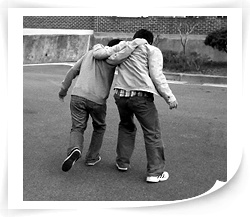Ka-Be
This chapter evoked strong emotional appeal to me, because I realized how prisoners in the camps are thankful to even the smallest thing in their lives after they were adapted to the hazardous way of life. After my mission trip, I had somewhat similar experience as prisoners that I felt even stronger sympathy toward them. During my mission trip that lasted for nine long days, I went to Thailand with my mindset fixed to serving other people who are under severe poverty. However, as the nine days dragged on, I increasingly missed my home, especially my computers. Before I went to the mission trip, using computer was a norm in my life that I did not appreciate the usefulness of the computers, however, when I couldn’t use the computers, I realized how essential they were in my life. Later, when I returned from the trip, one of the first things I appreciated was the things that I saw everyday; family, house environment, bed, and computers. Similarly, prisoners in the concentration camps had lost all their property and life routine that when they received the smallest retreat of having physical comfort, they appreciated it in full extend. Like this, we tend to be ignorant about the things that we are so used to.
The harsh environment caused prisoners to have great attachment on the mundane schedules they were used to. “We had never seen its boundaries, but we feel all around us the evil presence of the barbed wire that separates us from the world (42). This quote suggests that prisoners in the concentration camps felt like they were the birds in the cages that their liberty to pursue their personal interest had been trapped. Not being able to do what they have always done painful, because it is always hard to be revolutionary and adapt to new things. Thus, the damage that the concentration camp gave to the prisoners was both emotional and physical factors.
Sunday, March 4, 2007
Subscribe to:
Post Comments (Atom)

No comments:
Post a Comment